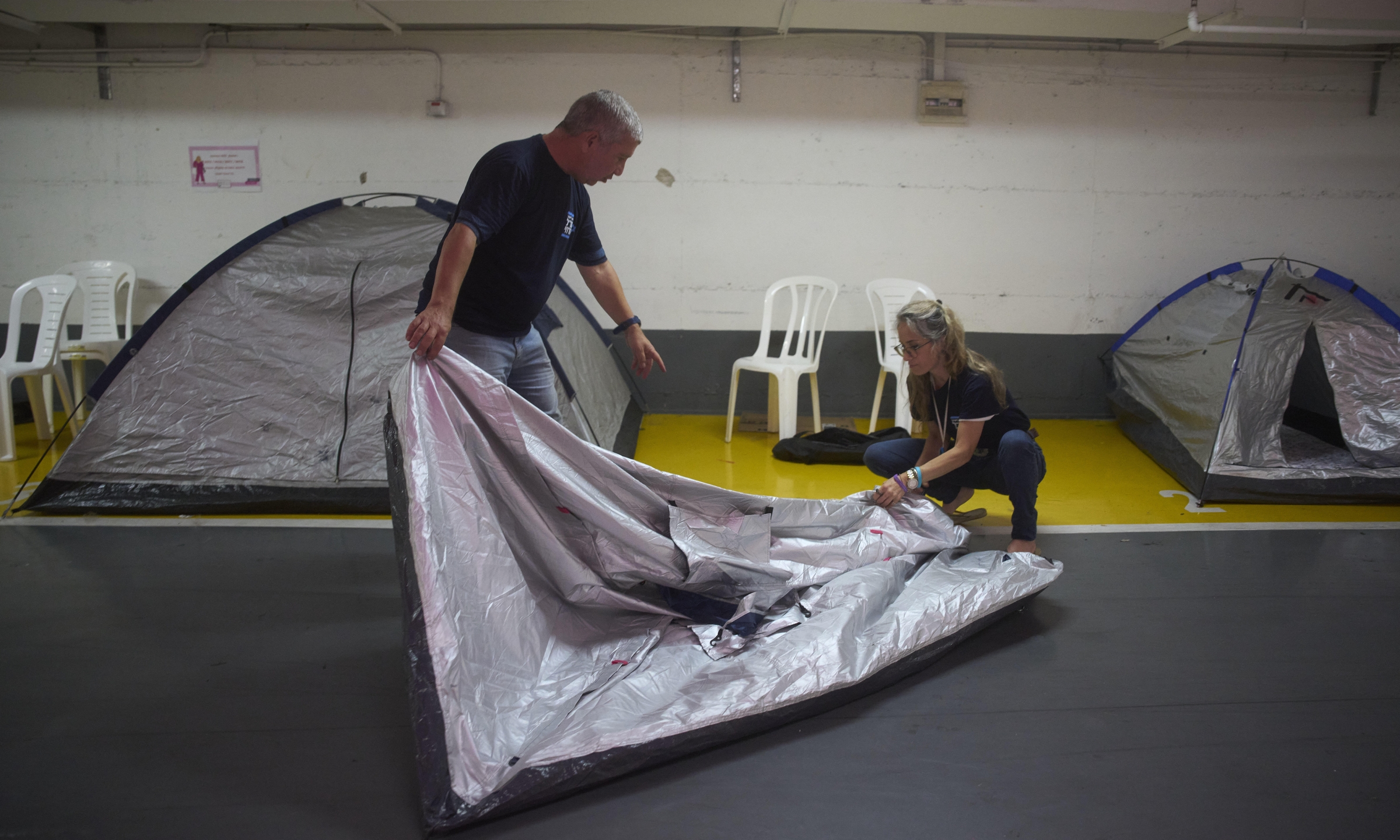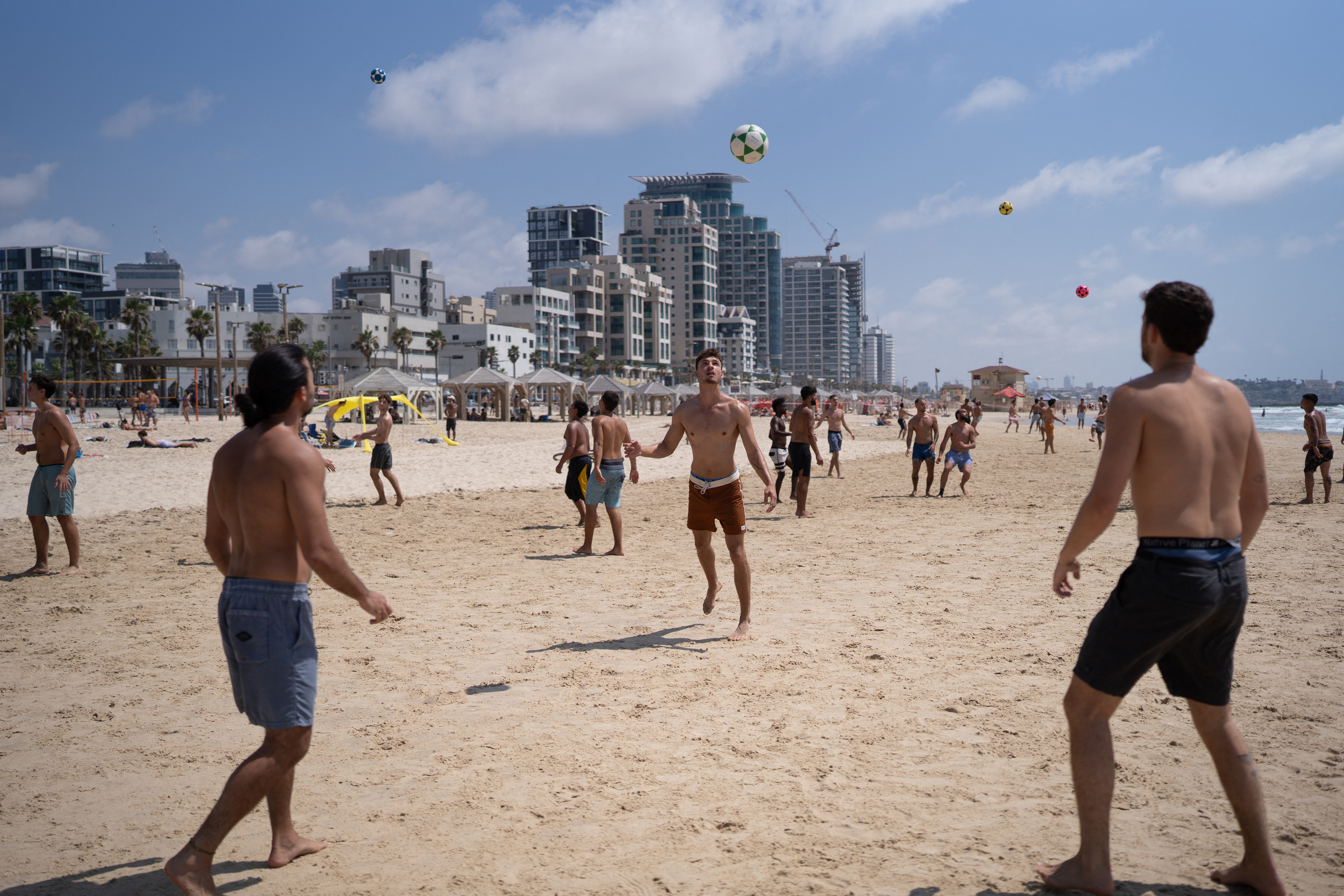On 24/6, just over an hour before the ceasefire took effect, an Iranian ballistic missile struck a seven-story apartment building in Beersheba, southern Israel, killing 4 residents and injuring 30 others.
Jessica Sardinas felt the blast from a shelter 300 meters away, where she had been taking refuge at night for the past 10 days. She had read the news about the ceasefire before going to bed on the night of 23/6, but she still couldn't believe it.
 |
People fold tents inside an underground shelter in Tel Aviv, Israel, on 24/6. Photo: AP |
People fold tents inside an underground shelter in Tel Aviv, Israel, on 24/6. Photo: AP
"I never thought there would be a ceasefire," Sardinas, a 27-year-old psychologist, said as she watched rescue workers sift through the rubble and crushed cars at the scene of the attack. "But I always hoped there would be one, because we are in danger every day here."
Sardinas, like many Israelis, was exhausted after nearly two weeks of fighting with Iran. For 12 consecutive days, Iran had relentlessly launched missiles at Israeli cities, while Tel Aviv's interception rate steadily declined.
"I used to tell my family and friends that I would always feel safe here. That was true until the conflict broke out. I'm not sure I would have moved to Israel if I had known this war was going to happen," said Sardinas, who emigrated from Argentina to Israel about three years ago.
As she spoke, it was still unclear whether the ceasefire announced by US President Donald Trump at midnight would hold.
In the final hours before the ceasefire, Israel carried out its most intense airstrikes, targeting Islamic Revolutionary Guard Corps (IRGC) sites and killing hundreds of Iranian security personnel. Iran, in turn, launched 5 waves of missiles into Israel in retaliation.
Israel also accused Iran of launching three more missiles after the ceasefire deadline, vowing a "resolute response," but Tehran denied the accusation. Israeli Defense Minister Katz instructed the military to "respond forcefully to Iran's violation of the ceasefire". He announced that Israel would launch heavy airstrikes "directly targeting central government targets in Tehran".
President Trump quickly restrained Israel, urging them not to carry out retaliatory airstrikes. Speaking to reporters at the White House, the president expressed his displeasure with Tel Aviv, which he said had quickly violated the agreement.
"Israel, as soon as we had the agreement, they went out and dropped a tremendous amount of bombs, the largest amount anyone's ever seen," he said as he left Washington for a NATO summit in the Netherlands. "I am not happy with Israel. When I said, 'Now you have 12 hours,' it doesn't mean that in the first hour you're going to go out and drop every bomb you have. So, I am not happy with them. I am not happy with Iran either."
Faced with the harsh comments from the White House, Israel decided to scale back its retaliatory airstrikes, preventing further escalation. Meanwhile, Israelis expressed gratitude to the US president for helping broker the ceasefire.
"I don't care much about what Mr. Trump just said about Israel. In the end, I think he really helped end this war, and that's what matters to me," said Daniel Kopylkov, a 27-year-old chef.
Kopylkov is from Haifa, in northern Israel. It is Israel's third largest city, after Jerusalem and Tel Aviv, and home to its busiest seaport and an important naval base. Throughout the conflict, Haifa was a prime target for Iranian missile attacks.
Historian Marc Volovici, 42, believes that Israel's backing down in the face of Trump's anger demonstrates Tel Aviv's dependence on political, military, and financial support from Washington.
"It's as if a father is scolding his child. He is scolding us. But it's nothing too serious," said a 70-year-old resident named Esther. "I'm not a politician, I just feel that way."
Lawyer Ephraim Glazberg, 75, agreed.
"I think it was just an outburst from the president. I don't think it's a big deal," he said.
Sighs of relief were palpable in Israel as the fighting ended.
"I want to be safe. For the past 10 years, Iran has been saying they want to destroy us. If what the American President said is true, that we've gotten rid of the atomic bomb, then this war will be over," said Gil Cohen, 51, who lives near the building that was hit in Beersheba.
Israel initiated the war on 13/6 by launching "Operation Roaring Lion," conducting hundreds of airstrikes across Iran. Tel Aviv insisted it was a preemptive strike to prevent Tehran from acquiring nuclear weapons. Iran quickly retaliated, launching missiles and unmanned aerial vehicles (UAVs) into Israel, beginning 12 days of tit-for-tat fighting.
Iran has long maintained that its nuclear program is for civilian purposes only. US intelligence assessments suggest that Iran is two to three years away from being able to build a nuclear bomb. However, President Trump and Israel disagree.
In total, the fighting killed more than 600 people and injured more than 5,300 in Iran, according to Health Minister Mohammad-Reza Zafarghandi. Israel reported 28 dead and more than 2,500 injured after missile strikes from Iran.
 |
People play ball on the beach in Tel Aviv, Israel, on 24/6, after the ceasefire with Iran took effect. Photo: AFP |
People play ball on the beach in Tel Aviv, Israel, on 24/6, after the ceasefire with Iran took effect. Photo: AFP
For Sardinas, these casualties are acceptable. She said Israel is "helping the world" by slowing down Iran's nuclear program.
Arik Daimant, a software engineer in Tel Aviv, remains optimistic about the ceasefire, even though his family suffered significant losses during the nearly two weeks of fighting.
"It's a shame, a bit late for my family, as our house was destroyed in the bombing on 22/6. But better late than never, and I hope this ceasefire will create a new beginning," he said.
Vu Hoang (Guardian, Reuters, AFP)












